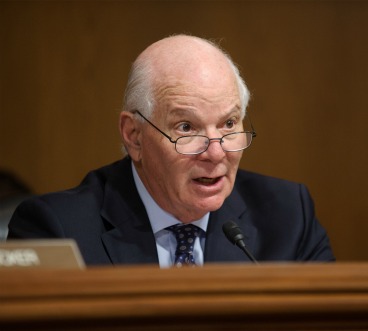WASHINGTON—At a hearing convened today by the Commission on Security and Cooperation in Europe, also known as the Helsinki Commission, Chairman Chris Smith (NJ-04) and other lawmakers examined why Central Asia has become an increasingly fertile source of foreign fighters for radical militant groups like ISIS, and explored how the United States can continue supporting efforts in Central Asia aimed at countering violent extremism and preventing the flow of foreign fighters to radical organizations.
“A year ago today, the city of Mosul fell to Islamic State of Iraq and Syria, or ISIS, during a wave of violence that swept brutally through Northern Iraq,” said Rep. Smith, who called today’s hearing. “Many of those who took part in the offensive were foreign fighters – in fact, the UN Security Council recently estimated that there are now at least 25,000 foreign terrorist fighters from more than 100 countries who have travelled internationally to join or fight for terrorist entities associated with ISIS and Al-Qaida.”
“According to the International Crisis Group, as many as 4,000 foreign fighters come from the five countries of central Asia. Just last week, we learned that the chief of Tajikistan’s counter-terrorism program – someone highly trained by our own government – abandoned his post to join ISIS,” he continued.
“What does this say about the current efforts to stop terror-minded men and women from volunteering and traveling to the Middle East?” Rep. Smith asked. “Clearly, our government – working with others and with organizations like the OSCE – must take stronger action to combat radicalization beyond our borders, as well as to ensure that returning foreign fighters do not bring jihad and murder back home.”
Witnesses testifying at the hearing focused on the risk factors for radicalization of Central Asian nationals, as well as efforts currently underway and additional recommendations on combating the recruitment of foreign terrorist fighters at the national and international levels.
“The nations of Central Asia, and the nations of the world, are waking up to the challenge of foreign terrorist fighters in Syria and Iraq,” said Daniel N. Rosenblum, Deputy Assistant Secretary of State for Central Asia. “The United States plans to continue to work with global institutions, regional groups, and national governments to confront the challenge of foreign fighters and reduce the threat to our partners, allies, and to our own country…the Department of State is eager to work closely with this Commission and others in Congress to address this generational challenge.”
Frank J. Cilluffo, director of the Center for Cyber and Homeland Security at the George Washington University, noted, “The ideology and narrative of violent Islamist extremist movements and groups continues to resonate with and successfully recruit individuals who are susceptible to such propaganda…Pushing back on this narrative in order to expose its inherent inconsistencies and falsehoods must therefore be a crucial plank in both national and transnational strategy.”
“We must maximize the intelligence that US officials and their counterparts in allied nations possess in order to best formulate and execute the measures that will keep foreign fighters’ plans left of boom,” Cilluffo continued. “The United States should work with the countries of Central Asia to assist them in building the capacities that are necessary for them to be their own best guardians. For instance, more could be done in the area of border security.”
Deputy Director of the International Crisis Group Jennifer Leonard said, “[Central Asian] governments must assess accurately the long-term danger jihadism poses to the region and take effective preventive action now…addressing multiple political and administrative failures, responding to an unmet demand for increased democratic space, revising discriminatory laws and policies, implementing outreach programs for men and women, creating jobs at home for disadvantaged youths, ensuring better coordination between security services, and police reform.”







